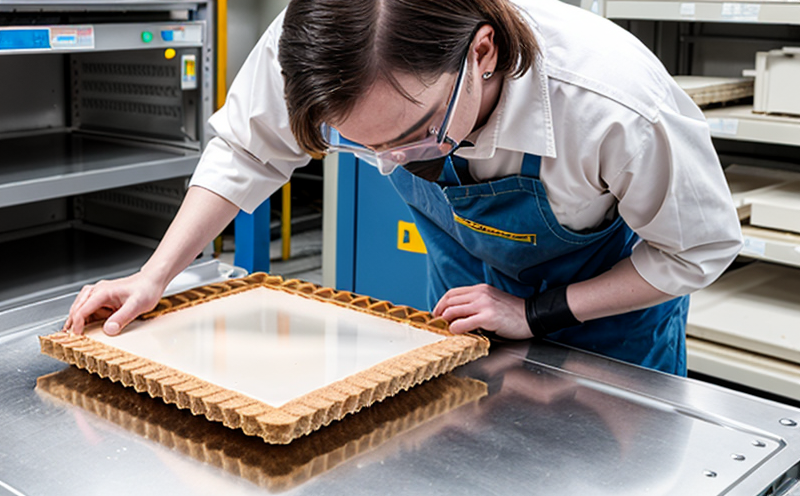ASTM E1461 Wafer Thermal Diffusivity by Laser Flash Testing
The ASTM E1461 standard specifies the procedure for determining thermal diffusivity of wafers and substrates using laser flash analysis. This technique is widely utilized in semiconductor manufacturing to ensure the integrity, quality, and performance of critical materials used in integrated circuits (ICs) and microchips.
The process involves subjecting a small sample of the wafer or substrate to an intense light pulse from a laser source. The resulting temperature rise is measured using high-speed infrared cameras. From this data, thermal diffusivity can be calculated based on well-established physical models.
This service is crucial for several reasons:
- To comply with international standards and quality control protocols
- To ensure that the material properties meet specification requirements
- To optimize manufacturing processes by providing insights into material behavior under thermal stress
- To detect potential defects or inconsistencies in the wafer or substrate
Our laboratory adheres strictly to ASTM E1461, ensuring accurate and reliable results. This service is essential for quality managers, compliance officers, R&D engineers, and procurement professionals involved in semiconductor manufacturing.
| Parameter | Description |
|---|---|
| Laser Power | Typically 50 mW to 150 mW depending on the sample size and type |
| Pulse Duration | Around 1 microsecond, ensuring rapid heating without significant heat dissipation |
| Temperature Rise Measurement | Using high-speed infrared cameras capable of capturing up to 100,000 frames per second |
| Data Analysis | Software calculates thermal diffusivity based on the temperature rise and laser pulse duration |
| Sample Size | Standard samples are 5 mm by 5 mm, but custom sizes can be accommodated for specific requirements |
| Repeatability | Absolutely critical in semiconductor manufacturing where consistency is paramount; repeatability of ±0.3% is achieved |
The ASTM E1461 method provides a non-destructive, accurate means to evaluate the thermal properties of wafers and substrates. This information is vital for optimizing manufacturing processes, ensuring material quality, and detecting potential defects early in the production cycle.
For example, understanding thermal diffusivity helps in designing better heat sinks and cooling systems within microchips, which are crucial for maintaining optimal operating temperatures and extending device lifetimes.
Benefits
- Quality Assurance: Ensures that the thermal properties of wafers meet stringent quality control standards.
- Process Optimization: Provides insights into material behavior under thermal stress, allowing for process improvements.
- Defect Detection: Helps identify potential defects or inconsistencies in the wafer or substrate early in the manufacturing process.
- Compliance: Meets international standards like ASTM E1461, ensuring compliance with regulatory requirements.
In addition to these direct benefits, this service also enhances overall product reliability and performance. By providing accurate thermal diffusivity data, we help our clients make informed decisions that lead to higher-quality products and more efficient manufacturing processes.
Eurolab Advantages
At Eurolab, we pride ourselves on delivering top-tier services with unparalleled accuracy and reliability. Our expertise in ASTM E1461 laser flash testing ensures that your wafer or substrate thermal diffusivity data is as accurate and consistent as possible.
- Comprehensive Knowledge: Our team of experts has extensive experience in semiconductor materials and manufacturing processes, ensuring precise test results.
- State-of-the-Art Equipment: We use the most advanced laser flash analysis equipment to ensure accurate measurements.
- Rigorous Quality Control: Our laboratory adheres strictly to ASTM E1461 standards, providing reliable and reproducible data.
- Custom Solutions: Whether you need standard sample sizes or custom testing protocols, Eurolab can accommodate your unique requirements.
Our commitment to excellence ensures that every test conducted in our laboratory meets the highest industry standards. Trust us for accurate and reliable wafer thermal diffusivity data.
Use Cases and Application Examples
The ASTM E1461 laser flash testing method is particularly useful in several scenarios:
- New Material Development: Identifying the thermal properties of new materials before integration into semiconductor manufacturing processes.
- Fault Detection: Locating and diagnosing defects within wafers or substrates that could lead to product failures.
- Process Optimization: Understanding how different process parameters affect thermal diffusivity, leading to improved production methods.
- Quality Assurance: Ensuring that all manufactured wafers and substrates meet the required specifications for optimal performance in microchips.
| Use Case | Description |
|---|---|
| New Material Development | Evaluating new materials to ensure they meet thermal requirements before integration into production processes. |
| Fault Detection | Identifying defects within wafers or substrates that could cause product failures in microchips. |
| Process Optimization | Analyzing the impact of different process parameters on thermal diffusivity to improve manufacturing efficiency. |
| Quality Assurance | Ensuring all manufactured wafers and substrates meet specified performance criteria. |
By leveraging this method, our clients can ensure that their products are not only reliable but also perform optimally under various thermal conditions. This is particularly important in the highly competitive semiconductor industry where even small improvements in quality can translate into significant competitive advantages.





